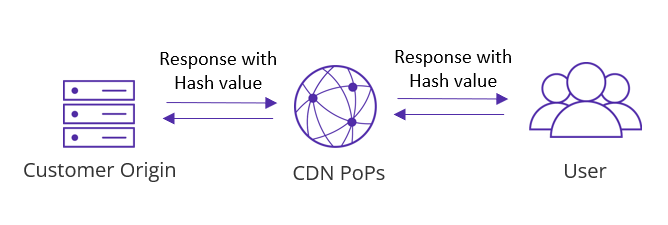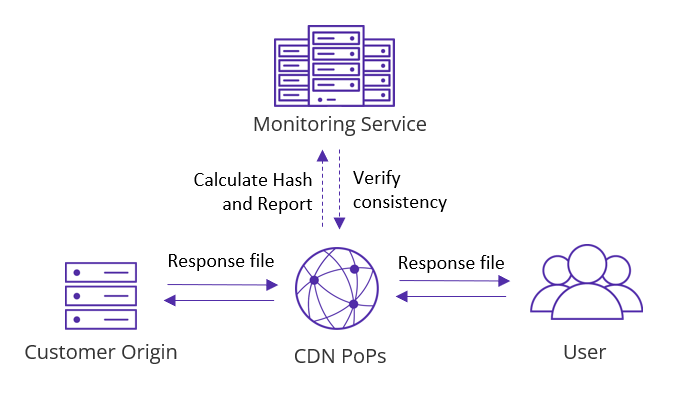CDNetworks' File Integrity Validation: Ensuring Content Integrity with MD5 Checksum
Table of Contents

As content delivery becomes increasingly distributed, the integrity of files in transit is more vulnerable than ever. Cyber threats such as man-in-the-middle (MITM) attacks can hijack user requests, while unauthorized modifications to data may occur undetected during transmission. These risks not only degrade user experience but also damage trust between content providers and their users.
To address this, CDNetworks provides a built-in File Integrity Validation feature that safeguards content integrity across the delivery chain. It leverages cryptographic hashes like MD5 checksums to confirm that files delivered to end users match their original versions.
In this blog, we’ll break down how our File Integrity Validation feature works and how it ensures reliable and secure file delivery in real time.
What is an MD5 Checksum and How It Works?
MD5, short for Message-Digest Algorithm 5, is a widely used hashing algorithm used to verify data integrity. It processes any input, from an HTML snippet to a multi-gigabyte software package, and generates a fixed 128-bit value. This value is commonly shown as a 32-character hexadecimal string. For example: e99a18c428cb38d5f260853678922e03.
Think of this hash as a digital fingerprint. In a typical content delivery workflow, the origin server calculates the MD5 file checksum and includes it in the HTTP response header: Content-MD5: e99a18c428cb38d5f260853678922e03. This allows downstream systems, like CDNs or operating systems, to verify the integrity of downloaded files and ensure they haven’t been tampered with.
Any changes, even the simple act of opening and resaving a file without any content changes, can alter the calculated MD5 value, whether it’s web content, system files, or other sensitive assets. That sensitivity makes MD5 especially effective in checking file integrity during content transmission.
CDNetworks’ File Integrity Validation: How It Works
CDNetworks integrates file integrity monitoring directly into its CDN infrastructure, giving customers assurance that files delivered via CDN have not been tampered with, particularly large assets such as software updates, game assets, or multimedia packages.
Watch the video to see how this feature works in under 3 minutes:
CDNetworks supports two MD5-based validation methods to accommodate different operational preferences:
Method 1: Origin-Provided MD5 Checksum Validation
This method leverages the MD5 checksum supplied by the customer’s origin server. It is ideal for customers who prefer strict control over content validation by using their own hash generation processes.
Here’s how it works:
- User Requests the File: A user requests a file that isn’t currently cached on the CDN servers.
- CDN Fetches from Origin: The CDN PoP forwards the request to the origin server.
- Origin Sends File & MD5 Value: The origin server sends the file along with the MD5 checksum in the HTTP response header.
- CDN Verifies File Integrity: Upon receiving the file, the CDN PoP calculates its own MD5 hash of the cached file.
- If the calculated hash matches the one from the origin, the file is delivered.
- If there’s a mismatch, the cached file is purged and re-fetched from the origin until the hashes match.

Method 2: CDN-Generated MD5 Validation
In this method, CDNetworks generates and verifies MD5 hashes, automatically handles the entire process. This fully-managed approach is ideal for businesses seeking a secure, hands-off solution for file integrity assurance.
At the heart of this system is a centralized monitoring platform, which maintains a record of trusted MD5 hash values reported by CDN PoPs. When a new hash is submitted by a CDN PoP, the system cross-checks it against its existing dataset to validate file consistency across the CDN.

Here’s how it works:
- User Requests the File: A user requests a file that isn’t currently cached on the CDN servers.
- CDN Fetches from Origin: The CDN PoP forwards the request to the origin server.
- Origin Responds: The origin server returns the file without a calculated MD5 hash.
- CDN Calculates and Reports MD5 Hash: After caching the file, the CDN calculates its hash using CDNetworks’ internal algorithm and reports the result to the monitoring system.
- Monitoring System Verifies File Integrity
- If the hash matches, the monitoring system feeds back a positive result, and the CDN server confirms the file’s integrity and delivers it to the end user.
- If there’s a mismatch, the monitoring system immediately feeds back a negative result, and the CDN server purges the cached file and prompts it to re-request the file from the origin until the hashes match.
Who Benefits Most from MD5-based File Integrity Validation?
File integrity monitoring (FIM) is crucial for any business that delivers large files or high-value digital content. Ensuring that files arrive fully intact is not just a best practice but a security measure to prevent potential security breach scenarios.
Here’s where CDNetworks’ file integrity validation makes the most significant impact:
Gaming
Modern games often involve downloading multi-gigabyte files, and a single compromised segment can trigger crashes or installation errors. CDNetworks ensures that your users receive the original, uncompromised game data, exactly as intended by the developer.
Video-on-Demand & OTT
High-definition and 4K video content is typically divided into segments for efficient delivery. CDNetworks validates the integrity of each segment, preventing any potential security issues and delivering uninterrupted, high-quality viewing experiences to your users
Software Distribution
Whether distributing software via direct download or through content delivery networks, vendors must ensure their files remain intact and unaltered, CDNetworks validates MD5 checksums at the point of delivery, ensuring the installation files are complete, secure, and untouched by tampering.
Conclusion
Delivering content at scale requires more than speed; it demands a balance of performance, data security, and reliability. CDNetworks ensures not only the integrity of your files through robust validation methods but also their rapid and secure delivery through our expansive global content delivery network, covering over 87 countries and regions.
Ready to optimize your web performance and elevate your media delivery? Start your free trial today to discover how CDNetworks’ comprehensive solutions can guarantee fast, secure, and seamless content delivery, wherever your audience may be.
More To Explore
Key Cybersecurity Statistics and Emerging Trends for 2026
A data-driven overview of cybersecurity statistics and emerging threats shaping 2026, including AI-driven attacks, DDoS, API exploitation, ransomware, phishing.
CDNetworks Successfully Mitigated a 1.01 Tbps Ransom DDoS Attack on a Major Software Download Platform
This attack was part of an organized RDDoS campaign that persisted for over a month. CDNetworks Flood Shield 2.0 ensured legitimate users experienced zero disruption.